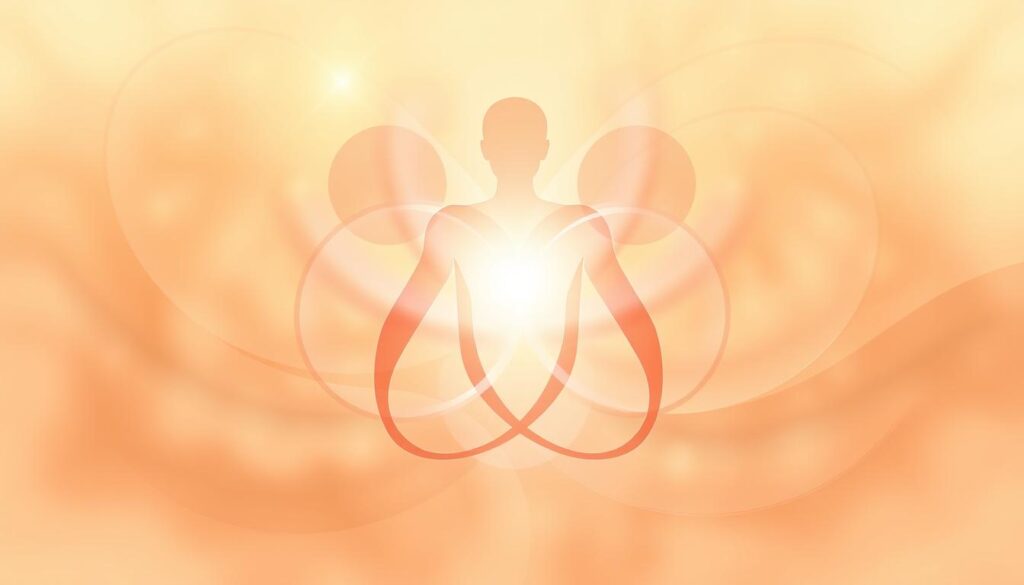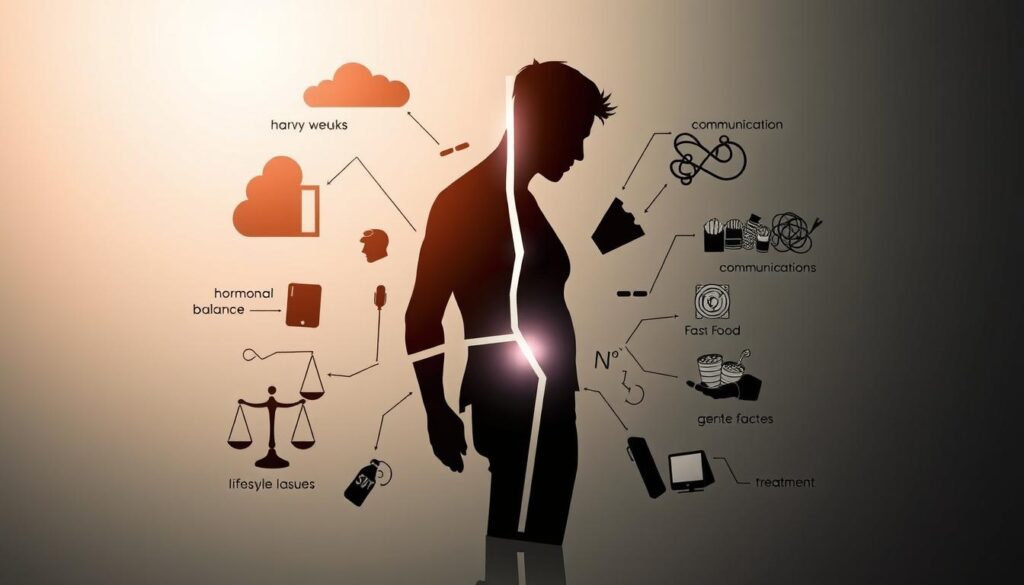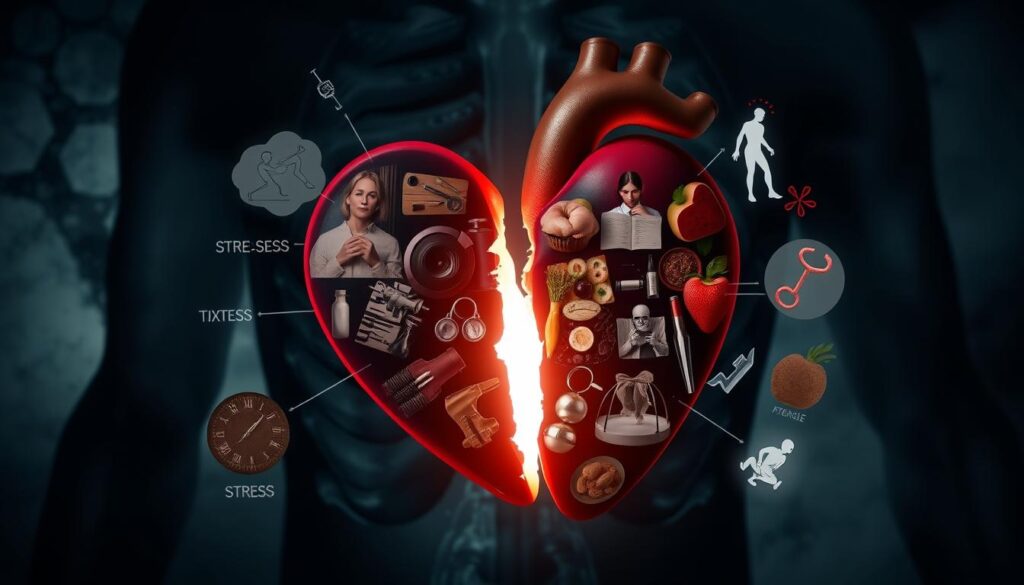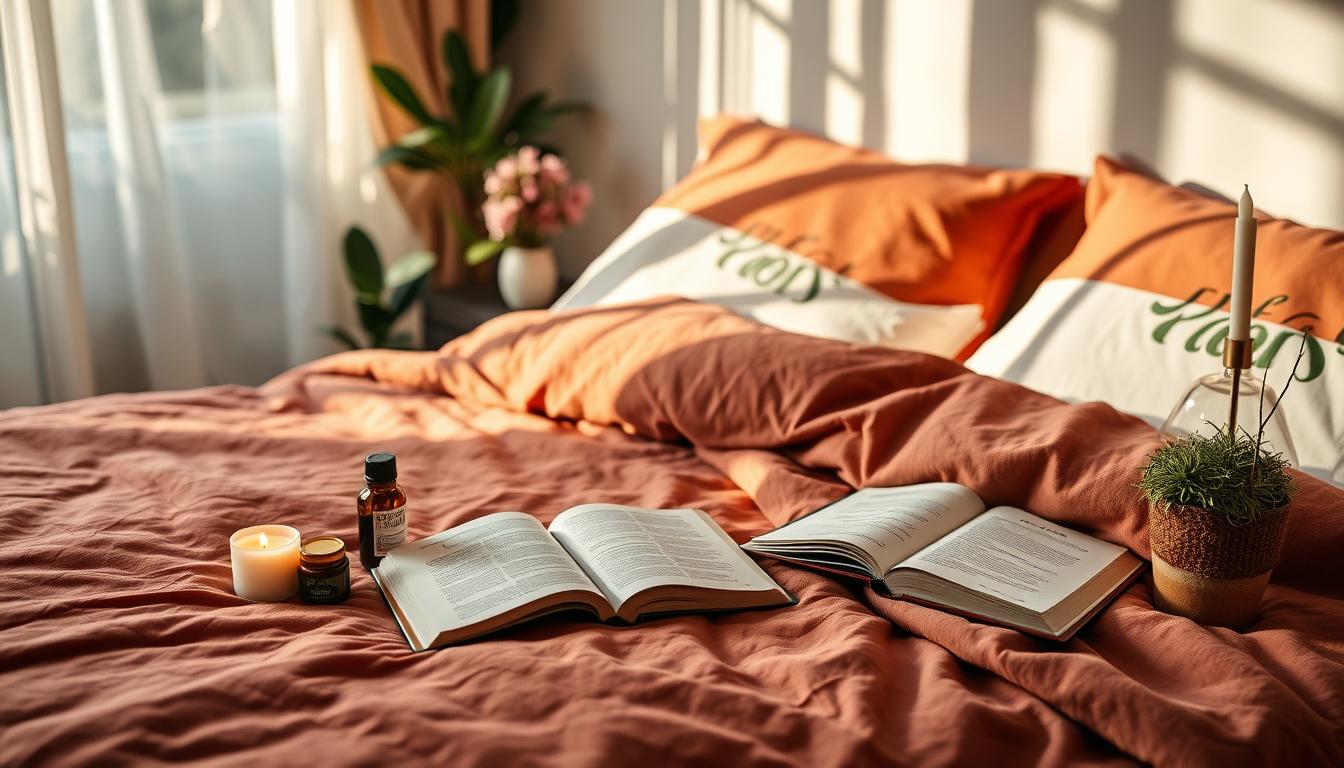Treatment for Loss of Libido in Males is a big deal, affecting both relationships and overall health. A 2019 study found that about 1 in 20 men aged 45 have low sexual desire. This is common, especially since nearly 35% of men over 45 have low testosterone.
Understanding this is key for men wanting to boost their passion and keep relationships strong. We will look into treatments for low libido in males. We’ll cover common causes, symptoms, and effective treatments to help men regain their sexual health.
We’ll talk about lifestyle changes, psychological factors, and the benefits of seeking professional help. Our goal is to help men take action to overcome this issue. By finding practical, personalized solutions, we aim to improve intimacy and overall quality of life.
Understanding Loss of Libido in Males
Many men experience a decrease in sexual desire at different times in their lives. About 1 in 5 men face this issue, which can worry them about their relationships. It’s important to know what affects male libido, both physical and mental factors.

For men, healthy testosterone levels are between 450 to 600 nanograms per deciliter (ng/dL). If levels drop below 300 ng/dL, it might mean low testosterone, which can lower libido. Conditions like heart disease, type 2 diabetes, and obesity can also affect sexual desire by changing hormone levels and overall health.
Drinking too much alcohol, more than 15 drinks a week, can also harm testosterone levels. This can lead to a decrease in sex drive.
Aging is another factor; testosterone levels can drop by up to 2% every year after 30. Stress, burnout, and some medicines, like antidepressants, can also lower libido. Making lifestyle changes and getting professional help can help improve sexual health and understand male libido better.
Common Causes of Decreased Sexual Desire
Many things can lower a man’s sex drive. Up to 1 in 5 men will face this issue. Relationship problems are a big reason for this. Stress and anxiety can also make it hard to feel like being intimate.

Health issues like diabetes and high blood pressure can play a part. So can depression, which can make sex less appealing. When men are feeling down, it can make everyday life harder, too.
- Too much alcohol can really cut down on sex drive. This is true if you drink more than you should.
- Using drugs, like marijuana, can also lower your interest in sex.
- Getting older can affect testosterone levels. This can make you feel tired and less interested in sex.
- Hormonal problems, like an underactive thyroid, can also hurt your sex drive.
- Some medicines, like those for mental health or blood pressure, can make you less interested in sex.
Staying healthy is key to fighting these issues. Exercise and eating well can help. They can help keep your hormones in check and boost your sex drive.
Physical Factors Affecting Libido
The physical causes of low libido can greatly affect a man’s sexual desire. Hormonal imbalances, especially low testosterone, are common with age. These changes impact not just libido but overall health.

Medical conditions like diabetes, heart disease, and obesity can lower sexual performance. Depression and chronic stress also play a role. They create a complex mix of emotional and physical health issues.
Some medications, like antidepressants and blood pressure meds, can decrease sexual desire. Changing these under a doctor’s watch can help. Talking to a healthcare provider about these issues can reveal hidden factors affecting sexual health.
It’s key to tackle these physical factors to boost libido. Changes in lifestyle, like better diet and exercise, and medical treatments can help. For more on what affects sexual drive, see this resource.
Psychological Factors Impacting Sexual Health
Sexual health is deeply affected by our minds. Stress and libido have a complex relationship. High stress often means less desire for sex. Many men struggle with mental health issues that affect their sex life, like anxiety or depression.
Almost 37% of men with erectile dysfunction also have anxiety. Younger men, aged 20 to 35, often face performance anxiety. About 28.5% of men worry about premature ejaculation, which can be caused by anxiety and low confidence.
Trauma, like childhood abuse or adult traumatic events, can harm sexual health. In fact, men with PTSD often struggle with sexual dysfunction. Psychological issues like anxiety and relationship problems are big reasons for sexual problems in men under 40.
Feeling bad about oneself and not thinking highly of one’s sex life is common. It’s important to tackle these mental challenges. Therapies like cognitive-behavioral sexual therapy and couple therapy can help. They support mental health and improve sex life.
Signs and Symptoms of Low Libido
It’s important to notice if your libido is low. Many men see a gradual decline in sexual interest as they get older. This can show up in different ways. Here are some common signs of decreased sexual desire:
- A significant drop in interest in sexual activities.
- Reduced spontaneous sexual thoughts or fantasies.
- Difficulty in maintaining an erection during intimacy.
- Feelings of frustration or shame related to sexual performance.
- A negative impact on intimate relationships, creating tension or misunderstanding.
These symptoms can be caused by stress, depression, or unhealthy lifestyle choices. Medical issues like diabetes or sleep apnea can also play a role. It’s key for men to watch for any changes they feel.
Talking openly with a healthcare provider can help find the cause of low libido. By spotting these signs early, people can look into treatments. This can help them feel more confident in their sexual health.
Recognizing Unique Challenges Faced by Men
The world of male libido is full of complex challenges. These can greatly affect a man’s sexual desire. Issues like hormonal imbalances often disrupt normal sexual function. These problems are made worse by psychological factors like performance anxiety and stress from daily life.
Relationship troubles can also add to these challenges, causing emotional strain that lowers desire. Lifestyle choices play a big role too. Poor diet, not enough exercise, too much alcohol, and smoking can all reduce sexual desire.
Work stress and societal expectations add more hurdles. Many men feel the need to meet high standards, leading to anxiety and lower libido. It’s key to understand these challenges to find effective treatments. These treatments should tackle the symptoms and the underlying causes of low sexual desire.
Effective Treatment for Lost Male Libido
Men facing low libido have many treatment options. These can help bring back sexual desire and improve overall health. This section looks at several male libido treatment options. It stresses the need for professional evaluation and personalized care.
Hormone Replacement Therapy
Hormone Replacement Therapy (HRT) is key for low testosterone, a common libido issue in men. By age 70, about 30% of men have low testosterone. HRT helps restore testosterone levels, boosting libido and erectile function.
Research shows testosterone therapy can greatly help. It’s especially beneficial for men with testosterone below 300 ng/dL. These men often face erectile dysfunction (ED).
Peptide Therapy Explained
Peptide Therapy is another option for improving libido. It uses specific peptides to affect sexual health pathways. This therapy can balance hormones and enhance sexual function, making it a good alternative or addition to traditional treatments.
Medications and Alternatives
Many medications help with low libido, especially for men with other health issues. For example, combining sildenafil with testosterone works better than sildenafil alone for low testosterone men. Herbal remedies are also being explored for their potential to improve sexual function. However, more research is needed to confirm these benefits.
Lifestyle Modifications to Enhance Libido
Many lifestyle changes can boost sexual desire and make intimate moments more enjoyable. Focusing on healthy habits is key to improving libido and sexual health. Nutrition and physical activity are two main areas to concentrate on.
Healthy Eating Habits
Eating foods that boost libido is important. Foods high in zinc, vitamin D, and omega-3 fatty acids help keep testosterone levels healthy. A balanced diet should include:
- Leafy greens and cruciferous vegetables
- Nuts and seeds
- Fruits such as watermelon and bananas
- Whole grains for sustained energy
Drinking less alcohol can also help. Too much alcohol can make it harder to get excited about sex. Keeping track of what you eat can greatly improve your sex life.
Regular Exercise Benefits
Regular exercise is a top way to boost libido. It can make you feel better, reduce stress, and increase energy. This leads to a more fulfilling sex life. Exercise also helps manage weight and improves blood flow, which is important for arousal.
- Cardiovascular exercises for heart health
- Strength training to boost testosterone
- Flexibility workouts like yoga to reduce stress
Doing at least 150 minutes of moderate or 75 minutes of high intensity exercise a week can greatly improve libido.
Building Relationships and Communication
Effective communication in relationships is key to building intimacy and satisfaction. Talking openly about desires and expectations helps create a supportive space. This encourages both emotional and sexual connections between partners. Research shows that 80% of people with Erectile Dysfunction see their sex lives improve when they talk openly with their partners.
Communication helps couples deal with relationship complexities. Activities like planned date nights can strengthen emotional bonds and increase pleasure. Studies show couples who try new things together see a 50% boost in sexual satisfaction. This highlights the need to keep these conversations going to maintain the relationship.
Getting professional help can greatly improve relationship satisfaction and libido. Couples who see sex therapists often see a 60% increase in sexual relationship satisfaction. Adding play and creativity to intimate moments can also boost pleasure, with a 70% increase in satisfaction reported.
Using sex toys can also help, with 45% of couples facing libido challenges finding them beneficial. Mutual masturbation is another technique that works, with 60% of couples finding it effective. Trying new settings or activities can also increase excitement, leading to a 55% increase in satisfaction.
Understanding how traditional masculinity affects intimacy is important. Men can form deeper connections by being open about their feelings and vulnerabilities. Overcoming anxiety and addressing intimacy issues are crucial for lasting relationship satisfaction.
For more on this topic, check out this useful resource.
Natural Supplements for Boosting Libido
Many people look for ways to boost their libido naturally. They turn to supplements known for their benefits. Herbal treatments like Maca root and Tribulus terrestris are popular for improving sexual health.
Maca root can increase sex drive by 42% in men over 12 weeks. Taking about 280 mg of Tribulus terrestris daily for three months helps women with sexual issues.
Fenugreek extract boosts sexual function and testosterone in men. Saffron also helps with erectile function and satisfaction.
While these supplements show promise, it’s important to be cautious. Always talk to a healthcare provider before starting any supplements. This ensures they are safe and effective for you.
Emotional and Mental Well-being Strategies
Improving emotional and mental well-being is key to boosting libido. Stress, anxiety, and relationship problems often lower sexual desire. Using mental health strategies can greatly enhance intimacy and connection. These strategies include:
- Mindfulness Techniques: Meditation and deep breathing can reduce stress and improve emotional and libido health.
- Therapeutic Approaches: Therapy, especially mindfulness-based cognitive behavioral therapy (MB-CBT), can tackle psychological issues.
- Self-Care Routines: Activities like exercise or journaling boost emotional well-being.
A study in the Journal of Clinical Psychiatry shows a strong link between emotional health and libido, especially in women. About 40% of women with sexual disorders also have depression symptoms. So, improving emotional health is crucial for managing conditions like Hypoactive Sexual Desire Disorder (HSDD) effectively.
Home-based strategies can also improve emotional well-being. Talking openly with partners helps build support and understanding. Stress-relieving activities can also help with low libido. By focusing on self-care and understanding the link between emotional health and libido, people can improve their life quality. For more on this, check out expert insights on low libido and its.
Seeking Professional Help for Sexual Health Issues
It’s important to seek professional guidance for libido when facing sexual health problems. Many men struggle with erectile dysfunction (ED), caused by physical or psychological issues. Getting help from healthcare ensures a thorough check-up and finding the root cause.
Talking openly with doctors is key to figuring out libido issues. Experts like urologists and endocrinologists can spot problems in the reproductive system and hormone levels. Mental health professionals also play a role, looking at the psychological side of things.
Looking for help can lead to real solutions. Blood tests can show if low testosterone is the issue. Treatments include pills, hormone therapy, and other methods to boost libido.
Yet, many people don’t seek help for sexual health issues. Even though they might want to. Making it easier to talk about sexual health can help more people find solutions.
Treatment for Loss of Libido in Males: Getting Started
Starting the journey to improve male libido begins with knowing yourself. It’s about understanding what affects your sexual desire. This includes your emotional state, health, and lifestyle. The American Urological Association says healthy testosterone levels for men are between 450 and 600 nanograms per deciliter (ng/dL). Fixing any hormonal imbalances is key to treating lost libido.
Seeing a healthcare professional is a must. Many libido issues come from health problems like heart disease or diabetes. Some medicines, like antidepressants, can also affect it. So, men should talk openly with doctors to find the right treatment for them.
Making lifestyle changes helps a lot. Eating well, exercising, and managing stress are important. Avoiding too much alcohol and unhealthy habits is crucial. With the help of doctors and personal effort, men can improve their sexual health and intimacy.






